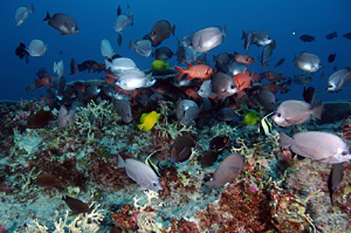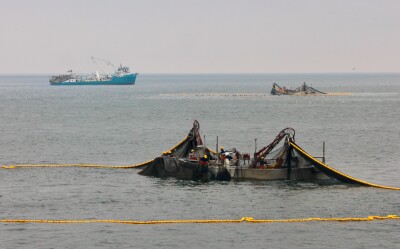A new study has identified a set of features common to all ocean ecosystems that provide a visual diagnosis of the health of the underwater environment coastal communities rely on.
Together, the features detail cumulative effects of threats -- such as overfishing, pollution, and invasive species, allowing responders to act faster to increase ocean resiliency and sustainability.
A school of fish in Northwestern Hawaii. NOAA photo.“Until now, we’ve had to look at the condition of different species and habitats individually. Having an easy-to-adopt approach that gives us a good idea of what is happening to the ecosystem as a whole – not just a piece of it – and anywhere on the planet, is a giant leap forward in managing marine ecosystems,” said Richard Merrick, Ph.D., NMFS director of scientific programs and chief science advisor. “It’s similar to giving a doctor the ability to look at a person’s whole body and treat an illness, not just its symptoms.”
Scientists incorporate satellite imagery, fishery surveys, and landings data to produce a visual image of the patterns in the food chain of the ecosystem. These patterns show when there is a problem. Scientists can also use the data in reverse to see how an ecosystem is recovering after a threat is reduced.
“For example, this discovery gives us an easier way to understand how an ecosystem is recovering after an oil spill,” said Jason Link, lead author of the study and NMFS senior scientist for ecosystem management. “The information will be especially useful as climate change and ocean acidification continue to alter our environment in unpredictable ways.”
The study is published in Trends in Ecology and Evolution. Researchers representing institutions in six different countries collaborated on the report. You can view the abstract or purchase the full version online.







